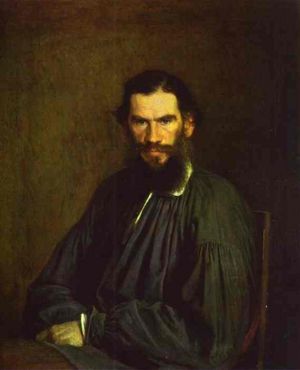Leo Tolstoy
Count Lev (Leo) Tolstoy (Russian: Лев Николаевич Толстой)(Yasnaya Polyana, Russia 1828 - Yasnaya Polyana, Russia 1910), Russian novelist, writer, essayist, agrarian anarchist and philosopher. He is one of the greatest of all novelists. Tolstoy's major work, War and Peace, appeared between the years 1865 and 1869.
In 1862 he married Sonya Andreyevna Behrs who bore him 13 children. In 1901 the Russian Orthodox Church excommunicated him. After leaving as a wandering ascetic, Tolstoy died of pneumonia on November 20 in 1910.
Writings
Some of his works:
- War and Peace
- Anna Karenina
- The Death of Ivan Ilych
- Sebastopol
- Father Sergius
- Forged Coupon, The
- God Sees the Truth but Waits
- Godson, The
- How Much Land Does a Man Need
- Imp and the Crust, The
- Ivan the Fool
- Kingdom of God is Within You, The
- Master and Man
- Repentant Sinner, The
- Resurrection
- Three Hermits, The
- What Men Live By
- Where Love Is, God Is
After finishing Anna Karenina Tolstoy renounced all his earlier works. "I wrote everything into Anna Karenina," he later confessed, "and nothing was left over." Voskresenia (1899, Resurrection) was Tolstoy's last major novel. [1]
The Kingdom of God is within you
Tolstoy's great philosophical/religious tract, The Kingdom of God is within you, summarised the development of his thought and reflections on Christianity. At its heart is the explanation of Tolstoy's belief that to truly call one's self a Christian one must abide simply by the teachings of Christ, as expressed in the New Testament. For Tolstoy, this meant, above all, pacifism, as expressed by Christ in the Sermon on the Mount. Tolstoy viewed any person or authority that violated this precept as having rejected Christ's teachings and, thus, as not being Christian. Tolstoy himself did not accept attempts by non-contemporary followers of Christ to re-interpret and de-contextualise the message of the gospels to permit certain forms of violence. This led him into direct conflict with the Orthodox Church and the Russian authorities. As such, The Kingdom of God is within you was banned in his home country, and was first published in Germany.
Tolstoy's philosophy has had a major impact on Christian pacifist movements, such as the Quakers, and on those committed to non violence.
See also
External links
- Literature Network » Leo Tolstoy
- On line books ClassicAuthors.net
- Anna Karenina by graf Leo Tolstoy Project Gutenberg
- Count Lev Nikolayevich Tolstoy


